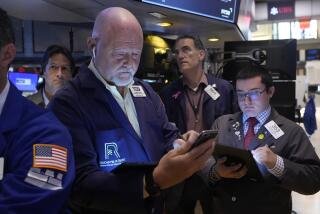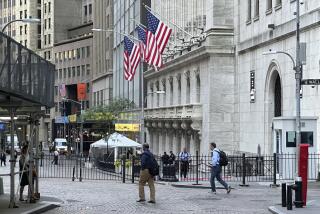Decision by Volcker Rocks Financial Markets, Adds to Inflation and Interest Fears
- Share via
NEW YORK — Paul A. Volcker’s decision to refuse a third term as chairman of the Federal Reserve Board jolted the financial markets Tuesday as already nervous traders and investors ran for cover amid anticipation of higher inflation, a weaker dollar and greater uncertainty over interest rates.
Within minutes of the news, those who deal in the financial markets were inundated with sell orders and stocks, bonds and the dollar had all suffered sharp declines. The price of gold--an investor’s haven from inflation--soared.
Only the stock market was able to shake off its initial blues. The Dow Jones industrial average lost 24 points in the first 15 minutes after President Reagan announced Volcker’s resignation but had fully recouped that loss only 20 minutes later.
The closely watched index of 30 blue-chip stocks eventually succumbed to pressure from a battered dollar and a weak bond market to end the day down 10.01 points at the 2,278.22 level on volume of 153.36 million shares.
The bond market remained depressed all day as investors concluded that the nominee to be the new Fed chairman, New York economist Alan Greenspan, will be less concerned about inflation than Volcker and more worried about recession. The Treasury’s key 30-year Treasury bond tumbled $32.50 for every $1,000 in face value, an unusually sharp one-day decline.
The dollar moved in tandem. Amid frenetic selling, it plunged by nearly 4 Japanese yen and by more than 3 German pfennigs. By contrast, precious metals soared. On the Comex exchange, the gold futures contract for June delivery gained $10 an ounce to close at $456.20, and the June silver contract rose 38.1 cents to $7.79 an ounce.
Despite its 10-point fall Tuesday, the stock market reaction seemed surprisingly mild and left many analysts puzzled.
“I don’t understand it. The Administration sends a message that it doesn’t give a damn about the dollar, and the (stock) market reacts like this? I have to believe there is going to be a little hangover here. After reflection, the market won’t be quite so euphoric,” predicted Michael Metz, a market analyst for Oppenheimer & Co.
A negative reaction from European and Japanese investors also could mean trouble for the U.S. stock market today, analysts said.
Some analysts speculated that the stock market would have lost 30 or more points but for the additional announcement that Volcker’s successor as overseer of the nation’s monetary policy is someone Wall Street admires.
“No one wanted Volcker to leave. But of the likely successors, Greenspan’s the best and that’s reflected in the market,” said Richard B. Hoey, chief economist for the investment firm Drexel Burnham Lambert. Hoey last month polled 512 institutional investment managers on their preference for a Fed chairman and found that Greenspan finished third, after Volcker himself and Gerald Corrigan, president of the New York Federal Reserve Bank and a Volcker protege.
Greenspan, chairman of the President’s Council of Economic Advisers in the Ford Administration, is well known in the U.S. financial community as a free market advocate and a pragmatic conservative. Wall Street observers also don’t detect any wide divergence between Greenspan’s economic philosophy and Volcker’s.
But Greenspan doesn’t have Volcker’s stature overseas. “He is an unknown quantity in international finance, as you can see from the near free fall of the dollar,” said Allen Sinai, chief economist for the Shearson Lehman Bros. investment firm.
Dollar Intervention
Analysts said damage to the dollar would have been even worse but for reports of intervention by the Fed and the German central bank.
Wall Street currency specialists said they took calls all day Tuesday from foreign investors wondering whether Greenspan is equipped to deal with such weighty international issues as Third World debt and the value of the dollar.
“The perception from abroad clearly is that he doesn’t have any international standing, and no one is sure how much understanding he has of global economic issues,” said Jonathan Francis, an economist specializing in international markets for the First Boston investment firm.
Analysts said the dollar was under pressure Tuesday even before the Volcker announcement, largely because of speculation overseas that the economic summit next week would be unproductive because of Japanese Prime Minister Nakasone’s plunging popularity at home and West Germany’s decision against reducing interest rates.
But upon word of Volcker’s impending departure, frenzied selling began and the dollar’s value registered a swift and steep decline--despite Greenspan’s prediction at a morning press conference that the dollar has reached its low point.
“Paul Volcker was a market stabilizing factor. He was willing to let interest rates rise gradually to take some of the pressure off the dollar, and now his influence is gone,” said Carmine Rotondo, a currency specialist with Security Pacific Bank. “Without him, many of us think the Administration will use the dollar as a weapon to wave in the face of our allies.”
Analysts said Greenspan’s appointment is viewed by the currency markets as an indication that the Fed will intervene less often to support the U.S. dollar in world markets.
More to Read
Inside the business of entertainment
The Wide Shot brings you news, analysis and insights on everything from streaming wars to production — and what it all means for the future.
You may occasionally receive promotional content from the Los Angeles Times.










